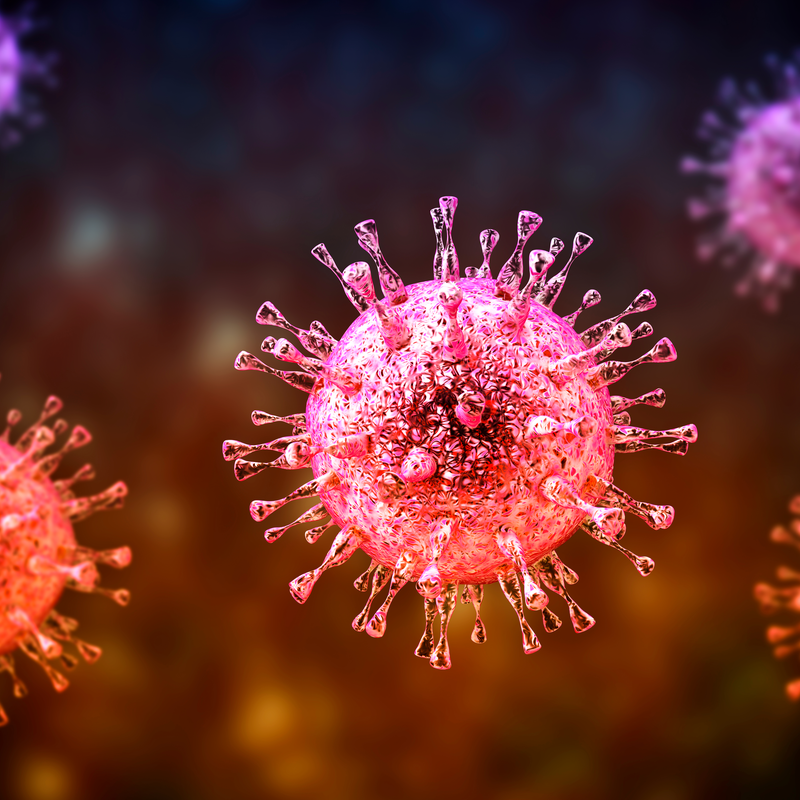
What is cytomegalovirus?
Cytomegalovirus infection (CMV) is a disease that usually affects the respiratory tract. The cytomegalovirus is a common virus that does not usually show any symptoms in a healthy person . However, people who generally have a rather weak immune system can become very ill if they become infected with the virus. The cytomegalovirus is spread through saliva, blood or sexual contact. In most cases, the infection heals on its own within 4-6 weeks. Again, in people with a weakened immune system, active treatment of the virus is necessary to prevent long-term complications .
What are the risks of cytomegalovirus?
Infections with the cytomegalovirus are very common, because the virus is spread worldwide. Studies of pregnant women and blood donors suggest that about half of the European population has already had a CMV infection. The risk of infection depends on people's living conditions and their age. Almost everyone is infected with the virus in their lifetime, mostly in childhood, but it is also possible to come into contact with the virus for the first time as an adult. Once infected, the virus will remain in the body for life and can become active again whenever the immune system is weakened . People who take special medication because of another disease, such as AIDS, HIV or even leukaemia, have an enormously high risk of the cytomegalovirus coming back. For pregnant women who have never had the virus, there is an increased risk that it will be transmitted to the unborn child.
What are the symptoms of cytomegalovirus?
As already mentioned , people with a healthy immune system usually do not experience any symptoms. Rarely, flu-like symptoms such as fatigue, cough, fever and swelling of the lymph nodes appear. An infection during pregnancy also often shows no symptoms . An infection with the cytomegalovirus is particularly dangerous for people with a weak immune system. They are often infected with various organs. In many cases a special form of pneumonia develops. The absolutely typical symptoms are cough and shortness of breath. However, an infestation of the intestine and the liver is also possible. This then leads to symptoms such as vomiting, nausea and jaundice. If the virus attacks the retina of the eye, blindness can occur in the worst case. If a pregnant woman is infected with the cytomegalovirus, growth disorders and a certain form of hearing impairment can be a consequence for the newborn. In many cases, late neurological damage also occurs .
It is assumed that the incubation period, i.e. the time between infection and signs of the first symptoms, is about two to twelve weeks.
The symptoms at a glance:
- Fever,
- Muscle aches and sore throat,
- enlarged lymph nodes,
- Rash.
How is cytomegalovirus diagnosed?
Using a blood test, the doctor can detect an infection with CMV, because special antibodies in the blood can be found as evidence of an infection that has taken place . Appropriate specialists can also usually tell what type of antibodies are involved and whether there is a fresh, an older or a reactivated infection. Another way of detecting the cytomegalovirus is the examination for the presence of genetic information or also protein components of the virus in the blood or other fluids of the body. This type of examination is particularly used when an affected person's weakened immune system is unable to produce antibodies . If antibodies are found in the blood of a pregnant woman, checks are necessary at certain intervals. This is because it must be clarified whether the infection is a recent one. Close ultrasound examinations of the child are also essential. As a rule, these should be done every 14 days.
How is cytomegalovirus treated?
People, who have a healthy and intact immune system, do not usually need treatment. Immunocompromised people with an active cytomegalovirus infection need treatment with antivirals. These are supposed to inhibit the growth of the virus. They are also used in newborns with a prenatal infection with CMV. However, treatment with these drugs is not recommended for pregnant women or nursing mothers.
What is the prognosis for cytomegalovirus?
Since a CMV usually heals itself within 4-6 weeks, the prognosis is excellent. However, the virus remains in the body for a lifetime , where it can become active again at any time as soon as the immune system is weakened. People whose immune system is weakened can develop the following complications:
- Pneumonia,
- Damage to the eyes,
- Hepatitis,
- Inflammation of the entire nervous system.
In
women who are freshly infected with the virus
during pregnancy, there is a high risk that the cytomegalovirus will be transmitted to the
child and bring severe, if not fatal, consequences
for the child.
How can cytomegalovirus be prevented?
There is currently no vaccination against the CMV. Infections can be prevented with the help of thorough hygiene, such as washing hands for at least 20 seconds . Close kissing contact or even sexual activity with an infected person should be avoided . Sharing toothbrushes, towels or soaps should also be avoided. In the case of children, care should be taken not to put a dummy or food leftovers from someone other than the child in their mouth. People who knowingly suffer from a weakened immune system should take the first signs of infection, i.e. cough, fever etc. seriously and consult a doctor.
